The Public Council for the Arava Institute held its final event for 2014 on December 26th at the Peres Center for Peace in Tel Aviv-Yafo. Approximately 60 Public Council members, friends and affiliates attended the two hour occasion. Ambassador Daniel Shek, Chair of the Public Council opened the event by commenting on the especially challenging year that faced the Institute. This summer’s Gaza War, followed by the turbulent events in Jerusalem, cast a dark shadow on the possibilities for peace in the region, while the massive oil spill at the Evrona Nature Reserve (described below) in the southern Arava on the border with Jordan, caused immeasurable damage to one of Israel’s most unique ecosystems. Just 15 miles south of the Arava Institute, the Evrona Nature Reserve was a major platform for the Institute’s ecological cross-border research. Ambassador Shek pointed out that the events of this past year emphasize the critical role that the Arava Institute continues to play in maintaining a safe space for cross-border dialogue and environmental cooperation. Daniel then introduced Yousef El Miadi, the Institute’s first student from Morocco, who enchanted the audience with the story of his journey to the Institute and his experiences so far.
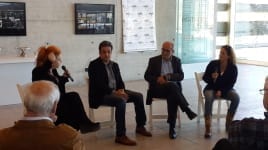
Finally, Ambassador Shek introduced Israeli journalist, television host and member of the Israeli Public Council, Daniel Ben-Simon, who facilitated a panel discussion of three Israeli artists; singer Achinoam (Noa) Nini, movie producer Menashe Noy and actress Sarit Vino-Elad. All three were asked to express their opinion on the role of politics and art in Israel. The discussion was lively, engaging the panelists and the audience in this timely debate. All three participants are outspoken in their political opinions and each has been impacted at various times by public reaction to their courage to speak out. The Institute was proud to host such an event with the help of Public Council members on the eve of Israeli elections when political debate becomes part of the air we breathe.
We hope you enjoy this final blog for 2014 and we look forward to 2015 with a fresh hope for peace and a renewed commitment to our shared environment.
David Lehrer
The Arava Institute Hosts MASHAV
December 1st through 16th, the Arava Institute once again hosted its biannual MASHAV course. MASHAV is a program with the Agency for International Development Cooperation under the umbrella of Israel’s Ministry of Foreign Affairs. This particular program focused on Water Resource Management in Arid Lands: Focus on Non-conventional Water for Agriculture, Conservation and Domestic Use in Drylands. Water sector professionals from Peru, Kenya, Kyrgyzstan, Montenegro, Nepal, Ghana, Uganda, Kazakhstan, Kosovo, Eritrea and Macedonia were brought together for a curriculum focused on topics ranging from global water scarcity to river restoration and greywater treatment and reuse.
There Arava Institute was also lucky to have a brief visit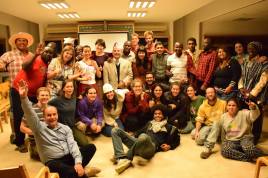
MASHAV participants met with students at the Arava Institute, toured the region and presented aspects of their home cultures at a kibbutz-wide Culture Night. They also took part in an overnight field trip which included a visit to the Dead Sea, an informational tour at the Safdan wastewater treatment/reuse facility, water sector meetings, and a tour of Jerusalem.
The program was a success and saw an exceptional amount of interaction between Arava Institute students and MASHAV participants, fostering many friendships. Thanks to Tali Adini, Abby Lutman and Amit Chertoff for their organizing efforts.
Submitted by Allyza Lustig
Eilat-Eilot Green Energy Conference
The 6th International Eilat-Eilot Green Energy Conference & Exhibition was held December 7-9, 2014 at the Dan Hotel in Eilat. The conference was part of Israel’s Energy Week which included events all over the country, such as an Alternative Fuels conference in Tel Aviv. The Eilat conference was attended by leaders in alternative energy who presented on topics such as energy efficiency, smart and mini grid development, energy storage, natural gas, biofuels and the 50MW Timna Solar Park.
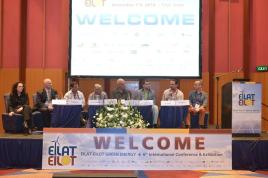
Over the past few years, Eilat-Eilot Renewable Energy has organized a range of events that promote the Southern Arava Desert as a center for renewable energy. This initiative is managed by the Eilat-Eilot Renewable Energy Initiative which works to create platforms for experts, policy makers and the general public to gain familiarity with renewable energy sources through education and activities.
Submitted by Michel Balassiano
Arava Institute Night
On December 15th the Arava Institute was proud to host its annual “AIES Night,” during which students from this semester’s Methodology course presented their independent research and studies. Project topics covered a wide range of themes including: 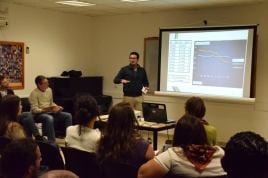
The night would not have been possible without the guidance and support from the two professors of the course, Dr. Dan Tamir and Dr. Gabi Banet, as well as the many faculty and staff advisers of the individual projects. Thanks also goes to the course’s teaching assistant, Kate Cohen, who was essential in coordinating the night’s program. The night was a complete success!
Submitted by Adam Finestone
Oil Spill Update
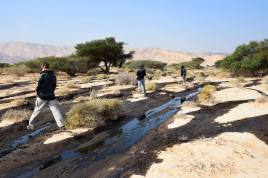
On a recent visit to the affected areas, researchers from the Arava Institute’s Center for Hyper-Arid Socio-Ecology (CHASE) saw rangers and workers from The Israel Nature and Parks Authority (INPA) removing contaminated soil and moving it in large trucks. Unfortunately, they were unable to complete their research and escorted out of the area due to health concerns about the fumes. Some students from the Arava Institute and area volunteers have joined to help out, take photographs, and observe the cleanup process from a distance. As things stand, INPA has the wadi restricted, but have remained transparent and informative about the cleanup process.
Submitted by Oren Rabinowitz
Intern Profile: Michel Balassiano
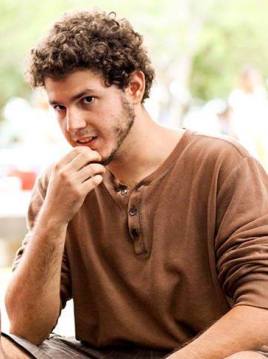
Michel previously lived in Israel when he was 18, with the Shnat Hachshara (Year in Israel) program of Socialist Zionist Youth Movement Hashomer Hatzair, with which he had been involved with since the age of 13. During that year, he studied in Jerusalem, lived on a kibbutz in the south-east, and volunteered in Nahariya and Akko. He has also volunteered with various projects in Brazil, including implementing composting programs and working with families in disfavored areas like favelas.
Michel currently studies Civil Engineering at the Federal University of Rio de Janeiro (UFRJ). He is especially interested in the potential of waste reuse, particularly biogas production, and hopes to learn more about this field while at the Arava Institute.
Submitted by Melanie Nakashian

